Japanese media have reported that helicopter carrier JS Izumo, the lead ship of the Izumo class, will be converted into an aircraft carrier capable of operating F-35B jets.
This news came to light after Japan’s new draft defence plan was published on December the 11th.
Japan also recently increased its order of F-35s, making the country the second largest operator behind the United States, a spot previously held by the United Kingdom.
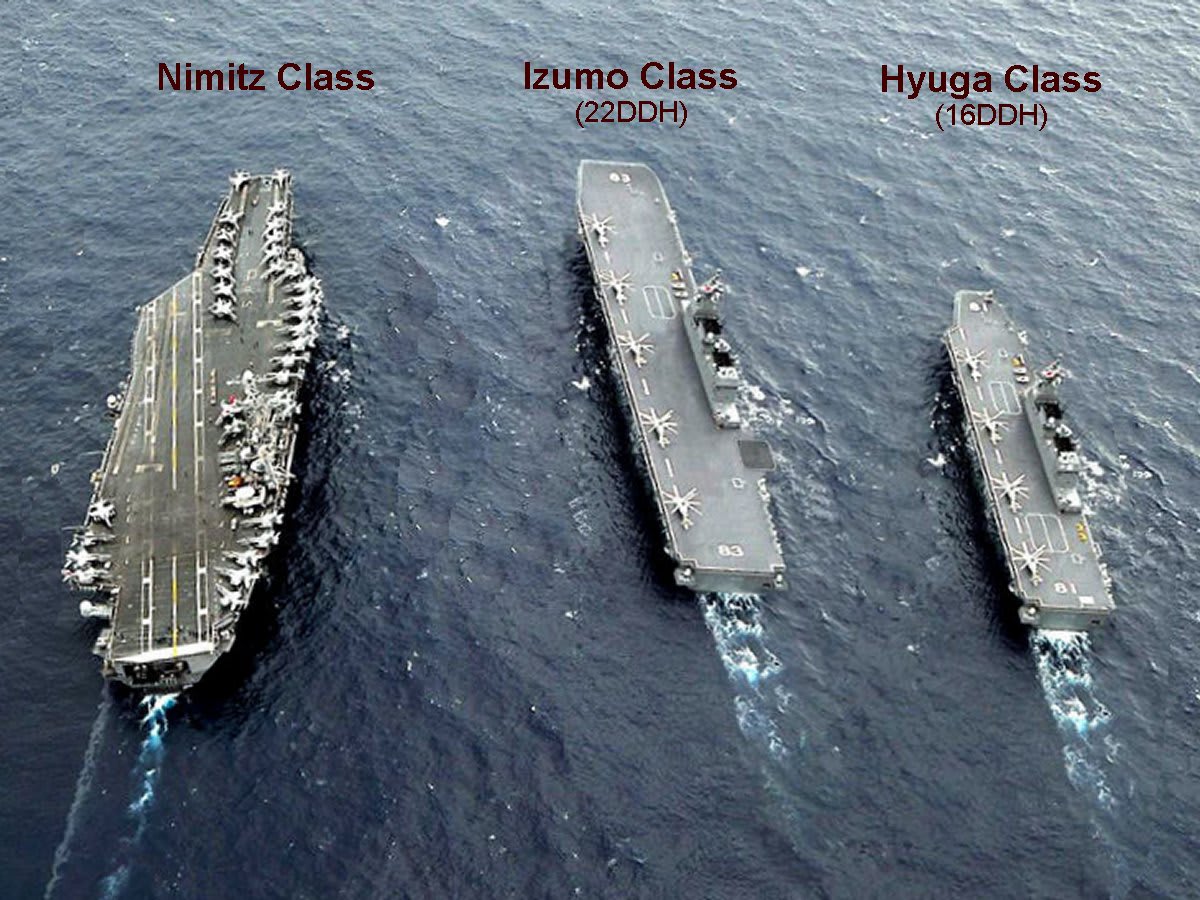
According to Aaron Mehta at DefenseNews here:
“Tokyo previously planned to procure 42 F-35A models. However, a source close to the program confirmed that Japan will be adding 63 F-35A models, as well as 42 F-35B models, for a total of 147 F-35 fighters.”

The National Defense Program Guidelines, which set out the aims and capability targets over a period of about 10 years for Japanese forces, state that the government will “enable fighter jets to be operated from existing warships, if necessary, to improve the flexibility of their operation”, say local media.
It was also reported that JS Izumo is to be redesignated as a multi-purpose escort destroyer to comply with Japan’s pacifist constitution that limits JSDF capabilities to self-defense.
“The Izumo was originally designed as a multipurpose escort ship, so it wouldn’t pose any threat to other countries if fighter jets are deployed on it,” Defense Minister Takeshi Iwaya was quoted as saying by The Japan Times on December the 11th.
Iwaya also reiterated that the warship would not be an “attack aircraft carrier” capable of offensive military operations, although it’s hard to see how that distinction can be made.
As we reported recently, before this March 20th confirmation, conversion of the existing Izumo class helicopter carriers was rumoured as an option for the F-35Bs Japan wants to purchase.
The 248-metre long Izumo, Japan’s largest warship equipped with a flat flight deck, was designed with an eye to hosting F-35B fighters. Its elevator connecting the deck with the hangar can carry the aircraft.


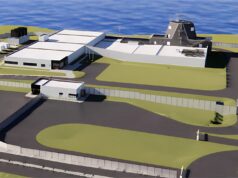
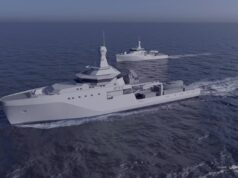
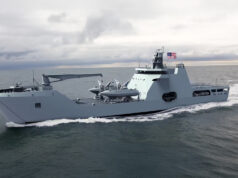
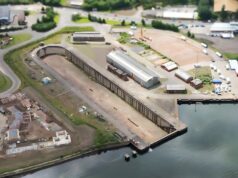
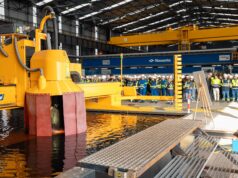
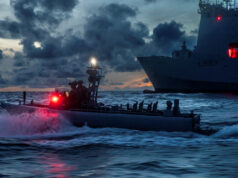
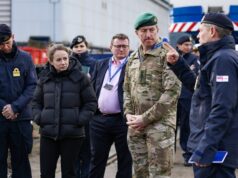
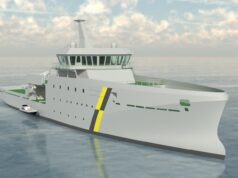
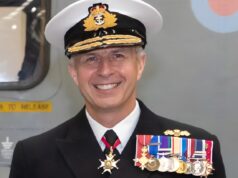
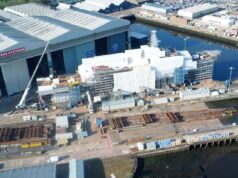

This reminds me of the Invincibles back in the late sixties early seventies. Don’t know what the original J Navy classification was but it would be cool if it translated to through-deck cruiser !
i think this was the plan all along.
WITH THE CURRENT SIZE OF THE JAPANESE NAVY, DO THEY NEED IT?
Absolutely, upgrading the Izumo from what was (for all intends and purposes) a helicopter carrier to a light aircraft carrier adds a major new capability to the JMSDF. The ability to operate VSTOL aircraft from a light carrier and / or from the many ‘disputed’ Islands with only limited airfields is nothing short of a game changer. This is a defensive move to counter the massive ‘offensive’ expansion of the PLA. It also gives the RN another carrier capable F-35B partner to exercise with.
a counter to the chinese expansion policy has to be welcome, will they get’ramps?
Their version was Helicopter-Destroyer. If possible even more misleading than Through-Deck Cruiser.
They were trying to avoid alarming the political left, who saw aircraft carriers as a symbol of imperialism, colonialism, and all other isms hated by the left. “Through-deck cruiser” sounded more acceptable.
Yep it was Vietnam era. Everywhere in the west militaries were not flavour of the month.
The Japanese seem to be moving away from their previous pacifist policy. No bad thing, they have moved away from the WW2 nationalist and militaristic past and have have adopted the western model of democratic, civilian control of the military. Carriers are interventionist and coercive by their very nature so it’s quite a change.
David Japan does not really have any influential left wing parties, all the big parts are centre right or centrist, there is a very small communist party but their influence is very low. Military dogma in japan (defence, defence, defence) is/was really driven by the level of national trauma over being nuked.
What we are seeing looks like a real shift in the thinking of the SDF, it would be really interesting to have someone who could give use some idea of recent publications on SDF thinking, but you have to suspect they are looking a a shooting war in the South China Sea in the foreseeable.
You have to remember beyond the trauma of WW2 Japan has always been one of the most militant and military cultures on the planet. It was the only None European nation that keep out The European superpowers during the age of exploration and Empire and by the 20C was the only none European or x colony (US) that could be considered a great power (as Russia found out to its cost).
Personally I think China is playing with fire when it comes to Japan and may get a bit more burnt than expected.
Thanks for your views Jonathan. I think Japan was concerned about the left in other countries also, such as South Korea, even the US, Taiwan, India. Agree that Japan has no really influential leftist parties, and that China needs to be careful about Japan. Japan has a very good record of wins against China.
The CGI pics of the conversion have been about for a while.
Good for the JMSDF. Bad news for Godzilla. 🙂
Chuckle
Steve, taking rubbish mate, We all know Godzilla could take a US super carrier as main course, so this is just a snack.
This is not true, the RN stated categorically that a carrier had to be at least 70,000 tons to operate the F35b.
No it didn’t. It had to be that size in order to cary out the operations required by the RN not simply operate an F35.
Deck size was in order to achieve the sortie rate.
It’s crazy how HMS QE can launch 24 F35bs in only 15 mins and recover 24 in 24 mins.
A US carrier could launch 60 cabs in 15 minutes.
Yeah ok that’s the Americans they always turbo everything.
So it’s about the same as QE with only one launch ramp and American carriers with multiple but it’s still roughly 30 seconds on both carriers to launch and aircraft from ramp or catipult.
Steve. How many can the US planes recover in same time? (I don’t know) I’m interested
P
It would be interesting to know what sortie rate was achieved in the Falklands (last real pressured western war) and how much this was limited by the size of the carrier Vs limited by number of planes Vs limited by turn around of refueling and maintance.
Paper sortie rate never made any sense to me unless you can achieve it in practice with the resources you will realistically have available to yourself
Only if it has 24 operational……….
Oops… Better tell the US Marines and the Italian Navy then, because they already plan to operate the B off flat-tops between 27,000 (Cavour class CVL) and 45,000 tons (America/Wasp class LHDs.)
Realistically, I think if this were said by the RN, they were probably referring to the minimum size needed to generate the kind of sortie rates and packages you see with US carriers, which is an entirely different ballgame.
2 × Phalanx CIWS & 2 × SeaRAM CIWS… Seems sensible?
Before someone bites! I’m joking… Couldn’t help myself!
Got to bite sorry. I would say 3 phalanx and sea ceptor silos say 2x 24 cell vl quad packed to take up minimum deck space or space on the wings
Welcome news, the addition of the F-35B to the Izumo class is a major upgrade for the JMSDF.
It also gives the RN another partner for cross training purposes. I would love to see the odd JMSDF F-35B operating from the QE class and vice versa.
A great oppurtunity to further develop the rapidly warming ties between Japan and the UK. No doubt they’ll be embedding crew members on QE class
Give it five years and there will be F35b manga / anime to enjoy………
Oh God please no
Not a fan of Stratos 4? Oh. 🙁
This is just a stepping stone to full sized carriers I assure you. The Japanese do military capability upgrades in increments to get their public used to it and to allow them to ease into greater controversial capabilities in small steps politically. Before this next decade is over the JMSDF will be building / sailing full sized CVs It will look something like this.
https://imgur.com/Zd00J
Cheers!
Or it’ll be a QE built under license
That would be a sight wouldn’t it? A QE class flying the Rising Sun. It would drive China nuts…
😀
Japan purchased all her modern warships from the UK.
It’s the reason why curry is the favourite food of the JMSDF.
Japan purchased all her early modern warships from the UK.
Yes it is. IJN Curry is still served on all units of the JMSDF every Friday along with milk and a tomato, lettuce, and egg salad. It was originally conceived as part of the solution to the Beriberi epidemic that plagued Japanese forces until it’s causality (lack of nutrients outside of polished white rice) was identified and rectified in the late 1800s. can I just say, not only is IJN curry historic,, it’s just plain TASTY – had some I made on this recipe just last week.
https://andrewzimmern.com/2014/01/09/japanese-soul-cooking-retro-curry/
Note: this is based on RN curry which was much more like a soup and meant to be sopped with bread. The Japanese adapted it to their cultural tastes (thickening) and with their readily available root vegetables.
To fight whom? They live next door to their biggest three threats.
The PRC , and maybe NK.
In Japan it’s all politics even more so than here. They need, want and can afford carriers it’s whether the public and parliament will let them.
The PRC? Do they have the sea room?
The PRC Army Navy(how is that for a title?) is the second largest Navy in the world, starting on build of their 3rd carrier, has more and larger landing ships than the RN, more subs than Russia, many more destroyers and frigates than Japan. At one time you could write them off as technologically primitive, but no more. Their existing SSBNs are noisy, so they will be sunk after launching their SLBMs. PRC is the biggest threat to the West.
Or a better idea we get 2 Royal Navy versions of the Izumo fitted out as LPHs and we build them a QE class. LPHs replace Ocean and act as secondary carriers/ ASW command ships. Something we are sorely lacking.
Bring back the ASW carrier.
https://i.pinimg.com/736x/87/a5/73/87a573a3eba2fce6e9cd0da65e757821.jpg
Cheers!
Am I right in thinking the Japanese Izumo class can hold more aircraft in its hangar than HMS QE?…
No
The picture in the s I’ve link shows 30+ aircraft in the izumo hangar alone! But in another link it says it can only hold 28 aircraft!. I’m confused! But if the picture is correct it can hold more the HMS QE in the hangar.
The link above! Ooops that is a possible future Japanese carrier! I couldn’t read the writing as it was blurred.
No CAM mate you are wrong there
All well and good but they need nuclear weapons and offensive missiles. Not enough aegis equipped destroyers on the planet to stop the incoming missile barrage from China if war broke out
Japan’s nuclear infrastructure is not only one of the most advanced but also one of the most extensive in the world. Along with a very extensive domestic missile industry. Taken together this means they can build nuclear weapons at will in whatever numbers are required. Ships take time, aircraft take time, tanks take time, and infantry take time, and time is more precious than anything.
Add into that the mutual defense treaty plus the number of American servicemen, ships, and economic ties to Japan.This makes the result of any nuclear strike on Japan by China a rather expensive and radioactive form of suicide. As the retaliatory strike from the US would turn China into the world’s largest plate of glow in the dark glass.
Eliot I’m not sure the US has the will to follow up on its nuclear guarantees. It’s not a criticism but is there a sane leader in the world that would support an ally to the point of taking a massive nuclear strike back. It’s one of the reasons the UK should never loss its own nuclear weapons. I have a lot of respect for the US, but I’m not sure mutual support would streatch to the US knowingly triggering a massive relatiation back on its own citizens, if say London was attacked.
The US would because the number of Americans killed in any attack on Japan. The number of servicemen their either permanently or passing through is simply huge. The other reason is simply due to the loss of equipment and bases any nuclear attack on Japan would cause.
The US couldn’t afford NOT to the yards couldn’t replace that many ships quickly. Nor could we replace that many aircraft or equipment stores that are forward deployed.
This doesn’t even get into precedents. If America doesn’t defend herself in Japan where would it? Guam, Hawaii and Samoa would be at risk as they are Islands far from home that would be stripped of the of more than 1/3 of the Pacific Fleet with Japan nuked, not to mention the total loss of the JSDF. Would they therefore be abandoned and left to the communists as “not worth the risk”? Would Alaska as it is not part of the contiguous 48 and therefore requires the cooperation or at least acquiescence of Canada to defend? Would we abandon it under the threat of nuclear bombardment or invasion as not worth the bulk of the US population? America will always retaliate in the Pacific. Whether the threat is Nuclear or conventional.
This is because unlike in Europe where America has little stake beyond sentiment, prestige, and economics in the Pacific the stakes for America are far higher. Because in the Pacific America has far flung territories in addition to a vast coastline and many allies looking to her for defense.
Probably right, i was thinking more if there was little initial harm to the US.
As you say this would not be the case with Japan as it has a lot of US troops and Treasure invested in it, as with the UK.
But I do wonder at other NATO Nations with little or no US presence. Would the US President (of any party) risk many tens of millions of dead Americans responding to a nuclear attack in kind on say Latvia etc.
I know what my thoughts would be if the British parliament decided it was going to court the destruction of me, my family, town, fellow citizens and nation in support of a tiny nation I or my nation had no links whatsoever to other than NATO expanding itself to the point of being irrelevant. Alliances should be between nations with a shared understanding in the present and vision of the future.
Look there will never be a war with nuclear weapons! Ever! We were close a few decades ago but it didn’t happen, it’s suicide for any nation to do so. Conventional war is far far more likely, so Japan doesn’t need nukes it just needs a good missile defence system and offensive system as most crucial infrastructure and warships ect will most likely be targeted by mega fast missiles on future. Maybe Japan having no nuclear deterrent is a good thing as it means they can build more destroyers/ helicopter carriers and submarines making it far far bigger than the Royal Navy.
The UK does not have nuclear weapons aboard the QE class. It was never meant to have them, but is still a strategic naval asset.
No one expected or though nuclear weapons would be on Hms QE. Lol
Correct me if I am wrong but does not the Japanese Constitution exclude its Navy from acquiring Aircraft carriers?
Nope. Under the strict reading of their constitution forbid weapons of offensive war from being “stockpile”. At least according to the courts.
Now if this was the late 40s through the early 70s they would have legal problems. After World War II the designation for a carrier in the USN (which the newly created JMSDF copied designations from) went from CV cruiser voler (to fly) to designations of subtypes (CVL,CVS,CVH, and CVU etc.) with the fleet and later super carriers getting the designations CVB meaning Large Aircraft Carrier and CVA/CVA meaning Aircraft Carrier Attack/Aircraft Carrier Attack Nuclear.
If those designations remained the same they would be in legal trouble due to Attack being in the designation. After 75 though the USN simplified the designation to just CV for Aircraft Carrier multiple purpose and CVN for Aircraft Carrier multi purpose nuclear. With anything smaller going into the amphibs L series with LHD or LHA.
Elliot, thanks for the informative post, I often wondered what the V was for in carrier designations.
Officially they can but by convention they can’t. If they tried to openly build a carrier there would be a huge fight in Parliament.
With the PRC building a multi-carrier power projecting navy, it’s just what is necessary to ensure Japans own security. Japan is a much different nation to that which fought WW2. A firm ally of the US & west.
Japan has a self-defence force Navy, with 26 destroyers, 6 destroyer escorts,, 10 frigates, 19 submarines, 4 helicopter carriers, 30 mine sweepers and 50,000 personel. magine what it’s going to be like in future. A great force.
Another split F-35 buy, folks!
Time for the UK to follow suit: Give 70 F-35Bs to the FAA and a similar number of the A variant to the RAF.
As I stated previously, I support a split buy for the second UK batch of 90 – 88 x F35B for the FAA and 2 x F35A for gate guardians at Marham.
Seriously, if the UK order does end up being split, it calls into question the option to operate both carriers to the maximum effect in times of need
Yes, please restore the FAA so the navy doesn’t have to gamble on the RAF allowing sufficient F35bs when needed & all aircrew are as competent with carrier ops as possible.
The restoration of the FAA before WW2 didn’t allow time to ensure it was equipped with the same state of art aircraft as the RAF operated. It was several years before FAA fighters could match the aircraft it was sent against.
As long as the FAA got at least 70, I suspect any split buy will see the RAF stopping at 48 bs which would hobble two of our biggest national assets.
It now depends on how the Japanese intend to use the F35 from their platform. If it is the same way as the US and the America-Wasp then it will be a rolling take off with a reduced weapons load due to a lack of the ski jump. Or if the RN method then it could mean that the RN and Japanese can co-operate with the deck design and training.
We had in our history a close co-operation with the Japanese Navy until 1922, possibly we could rebuild that co-operation.
It was the British who helped Japan first industrialise back in the day, introducing trains ect. We make a good team and the fact we are two strong island nations means we are similar in more ways than one.
Shorter than QEC with no ski jump. It’s going to be interesting to see how the take-off weights compare between F-35Bs operating from JS Izumo and QE/PoW. I’m not criticising, kudos to Japan for upping their order and doing this (I say through gritted teeth, given this has just knocked the UK down to 3rd place in the F-35 stated-buying-intentions league), just curious to see what the numbers will be.
Possibly connected, a quote from the article…
“Iwaya also reiterated that the warship would not be an “attack aircraft carrier” capable of offensive military operations, although it’s hard to see how that distinction can be made.”
I would assume that using an F-35B as a bomb truck to penetrate deep into enemy territory needs a much higher take-off weight than an F-35B that is going to be armed purely with air-to-air missiles so maybe take-off weight limitations are an answer to the question above because F-35Bs taking off from JS Izumo simply won’t be able to be loaded with sufficient fuel and weapons load to have a decent combat radius and do worthwhile damage at the end. Obviously AAR changes that equation (I assume) but that’s not always going to be available so maybe with the carrier plus escorts as a self-contained system that is where the Japanese are coming from with that “not an attack aircraft carrier” comment.
I assume it’s purpose will be as an escort carrier to protect against air strikes against the fleet, with maybe a secondary anti-shipping role. I doubt these aircraft will see much time over land at all.
The Hermes had a ski jump built after the FAA, correction, government, did away with all ship-born fighters except Sea Harrier.
There was a recent article about the US NAVY. The change over to the FA 18 and the F35 means that they will not have the effective range( it was about 1800 miles I think) that they used to. The new air wings just won’t carry the bomb load, or combat range, similar to the old A-6 and the F 18 Tomcat. The F25 B has even less range and bomb load than the F-35 A.
THe F-35 is going to down grade the combat effectiveness of lots of combat units.
With the Chinese making lots of long range anti-ship missiles the big carrier effectiveness is much reduced. Makes you wonder why we bothered. Is it all just a very expensive flag waving exercise?
The F-35 (A and C) already has better range than the Tomcat, while the B is about the same. Block III Super Hornet will as well. The addition of the mq-25 and v-22 tankers and potentially the F-35 engine upgrade will push this range out even farther. The RN doesn’t have the V-22 tanker but it’s an option they could pursue.
The A-6 has quite long legs, but it’s a subsonic attack plane with no way to defend itself, that offers some blessings.
Also neither the A-6 or Tomcat ever had a combat radius of 1,800 miles.
The are several reasons people (myself included) will always miss the A-6 Intruder. It was essentially a A-10 without the gun in terms of missions. The Intruder carried more weapons farther than most other aircraft in service at the time while still being armored for the CAS mission. They could carry 18000lbs (8200kg) of ordnance and had been upgraded through it’s service life for precision weapons.
All this while being one of the cheapest and most reliable aircraft procurement programs made by the USN.
The A-6 once took off carrying more ordinance than the a/c itself weighed.
I very Much agree with you Josh!
Still a lot of Un-informed comment on the F-35B!
Merion X
I have no problems with the F-35. But it essentially is a stealth F-16 with a big radar and a advanced computer. That is capable of in the B and C variants of carrier operations.
It will never match the ability of a A-6 or A-10 to service targets danger close to ground units while taking hostile fire. While also operating far from their bases. This is due to lack of armor, lift capacity, and fuel. The F-35 also due to being stealth are never going to be considered cheap while Intruders and Warthogs were.
Don’t care what the “results” are here. The F35 will NEVER replace the A10. Only thing that can replace an A10 is a modernized A10.
https://defensemaven.io/warriormaven/air/pentagon-f-35-vs-a-10-close-air-support-evaluation-hits-next-phase-qXj6tgp6g06nCJvtEMrzKg/
Cheers!
True. Jets have a very short range. There is still concern that the USN FJ fleet even with C coming on line (plus AAR too) is still short legged.
The F-35 bomb-bay is being lengthen for Block4 procurements to take Meteor missile and NSM.
Is it? I know some modifications are being made to the B model in order to allow it to fit more SDBs in, but as far as i’m aware the plan is for the B to accept Meteor with clipped tail wings in order to allow them to fit. JSM as far as i’m aware is not planned to be integrated into the B at any point (well, maybe externally), it’ll only fit in the A and C.
As I understand its almost impossible to lengthen, you have the lift fan constraint at the front of the fuselage and the swivelling nozzle at the rear. If it was possible they would have done from day 1.
If Rolls could come up with a more compact lift fan then that could allow the bay to be extended, its plausible to do as tech has moved on but unless the US want are going to fund it its unlikely to happen.
No, it is not being lengthened.
There also update to the F135 engine, adaptive cycle engine could give 20% more range.
It is true that the F-35b bomb-bay is to be lengthen a bit.
It seems to the rear part of it is 14 inches shorter.
http://www.tampabaydefensealliance.com/news/f-35b-internal-weapons-bay-cant-fit-required-load-small-diameter-bomb-iis-updated
@ Peter
Recover one every 40 seconds or so during the day and one per 60 seconds every night.
With Japan taking more F35s this could be the tipping point the pushes Turkey out the program. Japan could pick production done by Turkey along with other partner nations.
Could also be good for the UK with BAe’s simulation capabilities as well as areas like deck coatings. As we saw from the QE trials this will take Japan sometime and the UK are well placed to assist.
Turkey for now will retain F35 depot and component manufacturing processes. Along with the purchase of 100 A models. The DOD review panel looking into it just made the recommendation. I don’t think it’s a good idea with them also buying Russian ADA systems staffed with Russian techs on the radars… Hard to tell where Turkey will stand within the decade…
Cheers.
USAF takes delivery of operational LRASMs. USN F18s to be equipped in 2019.
https://www.janes.com/article/85364/usaf-receives-first-lrasm-missiles
Good start to reequipping the services with peer level systems.
Cheers
And to think we spent all this money on our carriers!
Merry Christmas.
https://edition.cnn.com/style/article/project-habbakuk-ice-aircraft-carrier/index.html
Building the first Type 26.
How will the world have changed in 8 years time? This is how HMS Glasgow might appear when she is finally operational in 2027. This design has the flexibility and space to evolve as the technology of naval warfare advances rapidly.
https://www.savetheroyalnavy.org/building-hms-glasgow-the-first-type-26-frigate/